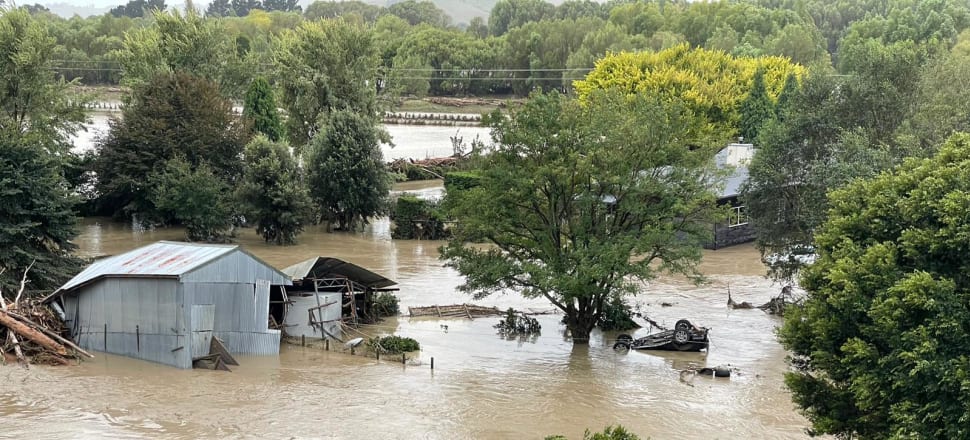
The eighth victim claimed by Cyclone Gabrielle is reported to be a 59-year-old woman whose body was found in her cottage's roof cavity
The number of deaths linked to the winds, landslips and floodwaters caused by Cyclone Gabrielle has risen to eight, with police this afternoon confirming another death near Napier.
In a statement, police said they were investigating a death in Puketapu, west of Napier, and believed the person died after being caught in flood water.
Formal identification is yet to take place, but Stuff has reported that the flood victim was a 59-year-old woman whose body was found in her cottage's roof cavity.
A ninth death - the father of former NZ Kiwis star Issac Luke - has also been reported after he was caught in a slip caused by Cyclone Gabrielle, but this has not yet been confirmed by officials.
Earlier this afternoon, Gisborne District Council asked people in the city to stop using the water immediately as the water treatment system has failed.
Council manager Scotty Sharp said people needed to stop using water in Gisborne City until further notice.
They are uncertain why it had failed but silt may have overloaded the system, he said.
Council chief executive Nedine Thatcher Swann said that included all water use for Gisborne city that was on the reticulated water supply.
The Navy ship HMNZS Manawanui arrived into Gisborne's port this morning loaded with bottled water and empty containers which could be filled from water generated by the ship.
But although the Navy had brought a lot of water, Thatcher Swann said said it did not have sufficient supplies to use as a back-up and the water it supplied would be mostly for drinking.
"The water that the Navy supplied is significant, the Navy can help in terms of drinking water but the volume we are looking at is significant and it will not be enough, what they can provide."
Tairāwhiti Civil Defence Emergency Management said there had been a major failure with the city's water treatment plant producing water for the city and the timing for repairs was unknown.
People should not panic buy bottled water, she said.
"We've been sending the messages since we've been aware of Waimaki Park coming offline so people should have sufficiently gathered some of their supplies - if there are any issues we will be using some of the local supplies if it comes down to it and we cannot get the fix in in time."
Justice and Regional Development Minister Kiri Allan who is currently in Gisborne said it was an emergency situation and people were being asked to act prudently.
"Right now there's a cease we're asking for a couple of hours, please stop using that water, we'll reassess in a couple of hours time to be able to provide further information."
Meanwhile, people in Auckland are still being evacuated from their homes in Piha as land remains dangerous and unstable days after Cyclone Gabrielle.
Locals are warning city sightseers to stay away from the Auckland beach community, saying they are still in the middle of an emergency.
Auckland Emergency Management is also asking residents of a street in Muriwai to leave after detecting land movement under houses.
The death toll from Cyclone Gabrielle rose to seven earlier today after police confirmed a person is believed to have died after being caught in flood waters in Waiohiki, near Napier.
Overnight, the second firefighter caught in the Muriwai landslide died in hospital.
Craig Stevens was taken to hospital in a critical condition on Monday night.
Fire and Emergency New Zealand chief executive Kerry Gregory said FENZ was still coming to terms with the news of his death.
All of Fire and Emergency would feel his loss, Gregory said.
His heart went out to Stevens' family.
Yesterday Fire and Emergency confirmed that a body retrieved from the slip was Stevens' colleague, Dave van Zwanenberg.
National Emergency Management Agency advice:
- Put safety first. Don't take any chances. Act quickly if you see rising water. Floods and flash floods can happen quickly. If you see rising water do not wait for official warnings. Head for higher ground and stay away from floodwater.
- Do not try to walk, play, swim, or drive in floodwater: even water just 15 centimetres deep can sweep you off your feet, and half a metre of water will carry away most vehicles.
- If you have evacuated, please stay where you are until you are given the all-clear to go home.
- If you don't need to evacuate, support those who do by staying home, staying off roads and staying safe.
- If you are not able to contact your whānau in the heavily affected areas go to Police 105 website and complete the inquiry form or phone 105 and remember to update if you reconnect through other means.
- Throw away food and drinking water that has come into contact with floodwater as it is often contaminated and can make you sick.
- If you are without power eat the food from your fridge first, then your freezer. Then eat the food in the cupboard or your emergency kit.
- People should stay up to date with the forecasts from MetService and continue to follow the advice of civil defence and emergency services.
- A National State of Emergency is in place for an initial period of seven days and applies to regions that have declared a local State of Emergency.







